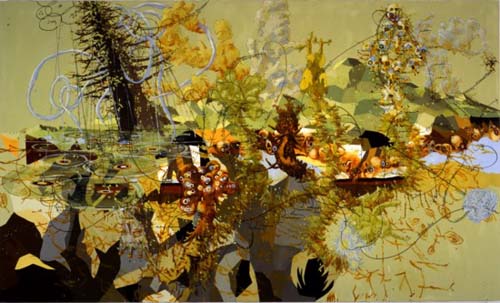Matthew Ritchie
dal 18/10/2001 al 24/11/2001
Segnalato da
18/10/2001
Matthew Ritchie
White Cube, London
The first solo exhibition in London of Matthew Ritchie, a British artist based in New York for over a decade. This installation is an introduction to a fragmentary narrative based around his own history and the geology and myths of the United Kingdom integrated in to an environment made up of separate elements: paintings, light boxes, wall drawings and large-scale topographical wall works effecting an overwhelming retinal blow out - a kind of visual and mental overload of light, colour and information.

The Family Farm
You Can't Leave Your Blood Behind
'I'm trying to describe the universe as if it could be seen and understood
by one person. A moment of perfect and impossible lucidity. But I can
only see through the blurry lens of my own life, so to help me animate
my futile investigations, I embody the forces of the universe; energy and
entropy, space and time, in the form of characters drawn from my own
frame of reference, invoking the chained and fragile coincidences of my
past.'
Matthew Ritchie
White Cube is pleased to announce the first solo exhibition
in London of Matthew Ritchie, a British artist based in New
York for over a decade. This installation is an introduction to
a fragmentary narrative based around his own history and
the geology and myths of the United Kingdom integrated in
to an environment made up of separate elements: paintings,
light boxes, wall drawings and large-scale topographical wall
works effecting an overwhelming retinal blow out - a kind of
visual and mental overload of light, colour and information.
All of Ritchie's work involves the collision of time-scales and
the kaleidoscopic condensing of various narratives and
information systems. 'The Family Farm' links his
grandmothers' childhood on an apple farm displaced by
Heathrow airport, with a history of the physical universe and,
in particular, the period known as 'the oxygen holocaust'
when aerobic life took over the planet, displacing the
previous occupants. For good measure the installation also
includes references to the Celtic cult of the severed head
and how the coastline of Scotland once connected to Maine
and Norway, before the break-up of Pangaea - the original
super-continent.
Since 1995, Ritchie's drawings, paintings and installations
have focused on visualizing an imagined structure of time
and space. Through the abstract interactions of colour and
shape on his canvases, on the gallery walls, and often on the
gallery floor, he offers up an elaborate cast of characters
and a series of exotic landscapes - each piece another clue
to unlocking the mystery of his universe. Large mosaic-like
abstract paintings are either laid over or placed along side
the colourful, diagrammatic wall drawings and floor pieces,
creating an incredible visual density. The installations seem
to unfold with a centrifugal force, overloaded with
indecipherable and arcane information. His pictures convey
a heady sense of cataclysm and imploding or exploding
energy, making reference to both Abstract Expressionism
and Minimalism but also cartoons and the Baroque, with
their fluid looping skeins of paint combined with bio-morphic
forms in strong flat colours of avocado green, mustard yellow
and purple. Each colour and form is tied to the evolution of a
character and a place. In Ritchie's first exhibition in New
York he provided the viewer with a chart that listed all the
fundamental forces at play in the universe and ascribed a
characterization to each one. As the project has progressed,
the characters have evolved, mingling and dissolving, just as
the 'real' universe developed from simple initial forces. A
parallel, unravelling narrative is described in Ritchie's
fictional writing where he fuses B-movies, hard science,
theological inquiry and pulp fiction, combining the 'sci-fi' of
Philip K Dick with the 'science' of Stephen Jay Gould.
Collapsing narratives, Ritchie formulates his own epic
version of the creation myth and of how time began.
Since the Western world seems simultaneously unable to
construct a coherent vision of itself but is obsessed with
hyper-reality and the fictional Disneyfication of everyday life -
from the labyrinthine, virtual worlds of the internet to the
planned architecture of consumerism -it is not surprising that
Ritchie, like other artists of his generation, has turned to
fiction to generate his own form of reality.
Ritchie has exhibited widely in both group and solo shows in
the US and Europe. This is his first solo exhibition in the UK.
Related areas of this chapter of his extended narrative will
be exhibited concurrently in group shows at Sammlung
Goetz, Munich and Castello di Rivoli, Turin.
For further information please contact Alexandra Bradley or
Honey Luard on 020 7930 5373. Open Tuesday to
Saturday, 10am - 6pm.
White Cube 44 Duke Street, St James's, London SW1Y 6DD



